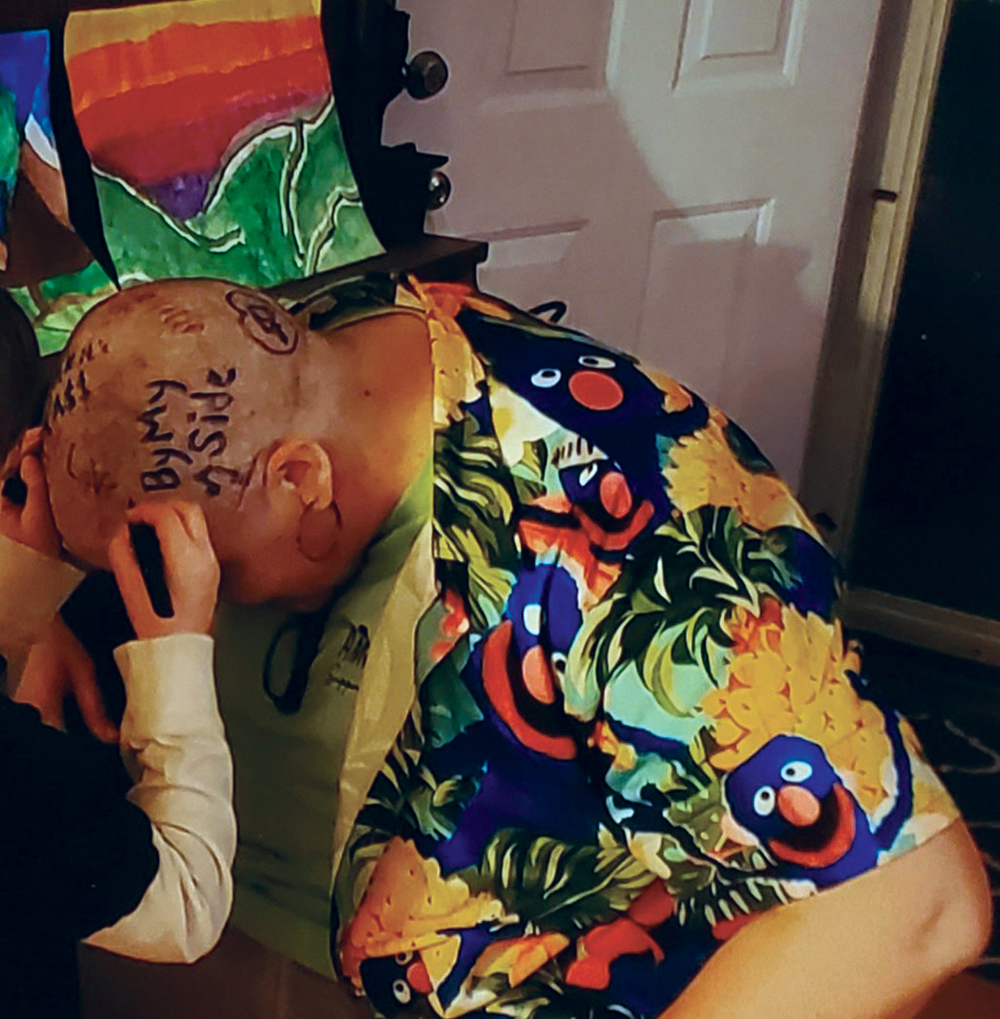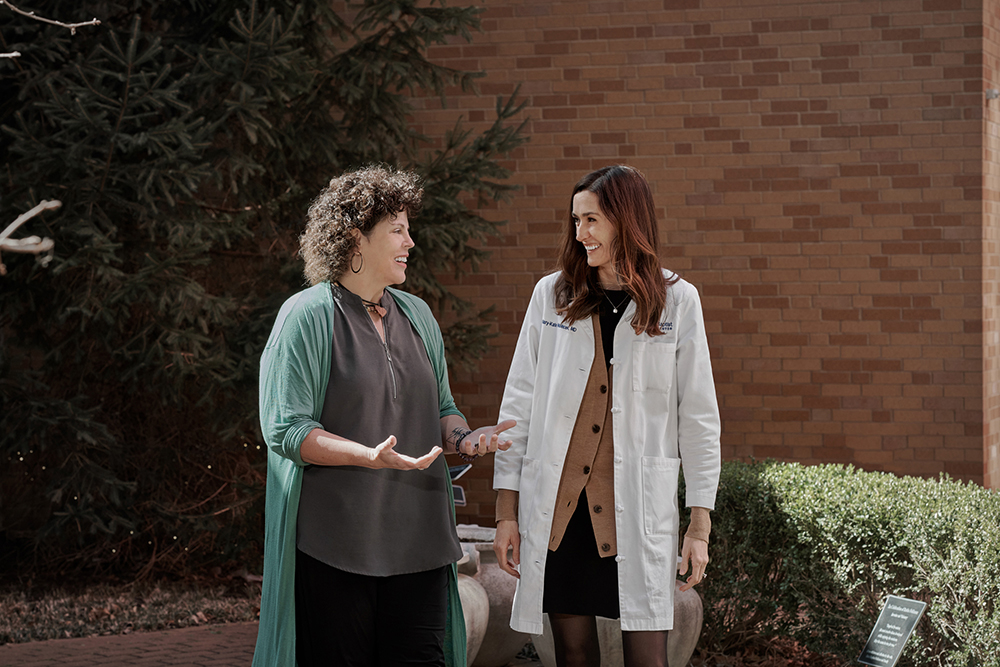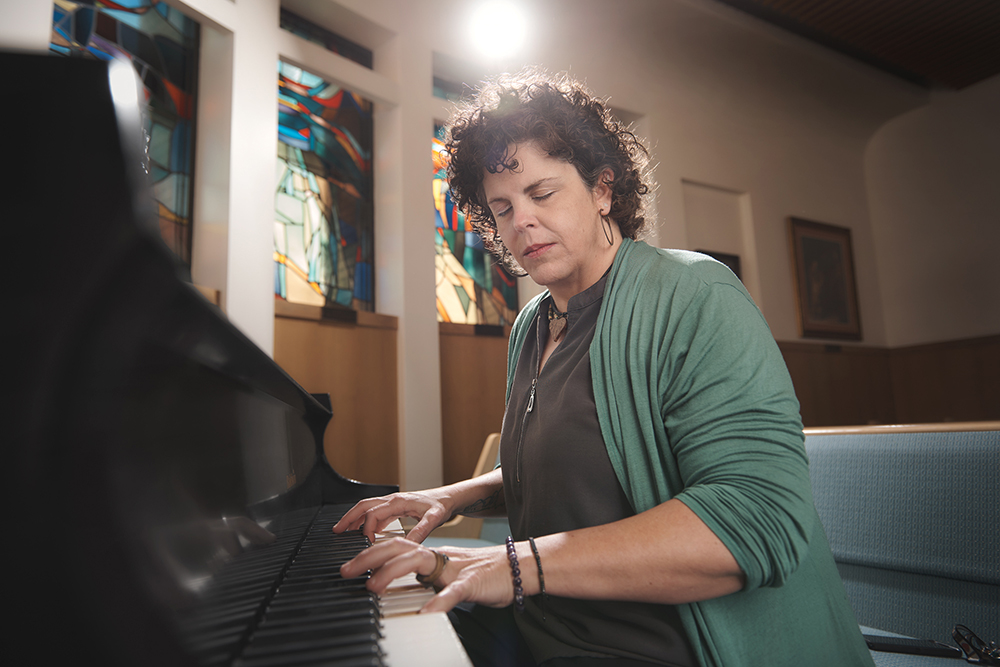Amanda “Manda” Suchara, a 44-year-old professional musician and hospice chaplain, was enjoying good health and had just started a new job. She never imagined that her life would look completely different in a few short months.
In September 2021, Manda began to notice that she had blurry vision and a hard time finding the right words to finish sentences. While performing, she had difficulty reading song lyrics and playing the piano with her left hand.
“I experienced dizzy spells every time I stood up,” Manda says. “My job performance as a chaplain also suffered, and I took a leave of absence from music and spiritual care.”
MRI Reveals Rare Cancer
Then, after suffering a seizure, Manda was brought to Missouri Baptist Medical Center’s emergency department. Doctors performed a magnetic resonance imaging (MRI) test of her head and saw changes to her brain’s white matter. During a surgical biopsy, doctors removed a small piece of brain tissue for testing.
The day following the biopsy, Manda received the news that her test results showed that she had B-cell lymphoma of the central nervous system.
Central nervous system (CNS) lymphoma is a rare type of aggressive cancer that develops in the central nervous system. It may form in the brain, spinal cord, spinal fluid or the eye (because it’s close to the brain). In Manda’s case, cancer cells were present only in her brain.
“My stomach sank when I heard the news.” Never questioning why me, Manda was ready to start treatment immediately.
So that her doctors could develop a treatment plan, Manda had a battery of tests, including a spinal tap, positron emission tomography (PET) scan, bone marrow biopsy and an eye test, to see if the cancer had spread beyond her brain to other parts of her body.
“Fortunately, all the other test results were negative,” Manda says. “Now, I was ready to take on cancer’s challenge and fight for my life.” Family, friends, colleagues, students, church communities and even complete strangers instantly bolted into action, surrounding her with support, hope and love. “The response was unexpected and more than I could comprehend.”
Ready to Start Treatment
As a cancer patient at MoBap, Manda would receive care from a multi-disciplinary team that included medical oncologists, a nurse navigator, social workers and nurses who specialize in oncology.
“Every patient is different, and a multi-disciplinary approach lets us provide comprehensive care and treatment for the patient,” explains Manda’s doctor, Mary-Kate Malecek, MD, a hematologist/oncologist on staff at MoBap.
Manda remembers meeting Dr. Malecek for the first time. “Her confidence made an immediate impression, and she didn’t give me false hope, which I appreciated. She was ready to start treatment right away and face the cancer head on, just like me. I felt that my entire care team had my best interests at heart and was there to support me throughout my cancer journey.”
The cause of CNS lymphoma is currently unclear, and treatment generally does not involve surgery.
“Instead, chemotherapy is an effective treatment option,” says Dr. Malecek. “In Manda’s case, we planned six intensive treatments of high-dose chemotherapy medication given through an IV.”
Compassionate Cancer Care
In October 2021, Manda had her first chemotherapy treatment. Her pre-chemotherapy anti-nausea drug and one of the chemotherapy medications were administered by IV in the MoBap outpatient infusion center, located down the hall from her oncologist’s office.
The MoBap infusion center, staffed by skilled oncology nurses who work closely with the oncologists, provides comfortable, private infusion bays with large windows to let in natural light and a view of the healing garden. “The nurses in the infusion center are amazing. They anticipated my needs before I even had to ask,” says Manda.
After her round of medications in the infusion center, she moved to the oncology floor for additional chemotherapy given with IV fluids.
“The type of chemotherapy Manda received required that she stay in the hospital for fluids and medications to help her body clear it. We then monitor not only the levels of chemotherapy in her blood until it is safely out of her system, but also for signs of damage to other organs,” explains Dr. Malecek. “Manda did great tolerating this treatment.”
“I felt at peace during treatment, but it was difficult to wait patiently for the next step,” Manda admits. Though, the care she received from the entire MoBap team made the waiting easier.
“During every visit, my care team was gentle and encouraging. Because of the rarity of my cancer, I was reassured as I watched physicians and nurses collaborate. Even the housekeeping staff greeted me with smiles. It was an endless parade of hope.”
Manda’s family also gave her unconditional love and support. “My dad and stepmom sent uplifting emails and texts. My siblings made profound sacrifices to be there for me. I had more visits and video chats than I can count and never had to worry about Steinway, my dog. A close friend sent daily greeting cards by regular mail and another created a grab-box of daily reflections. The support was overwhelming and really made a difference.”
Unexpected Challenges
Midway through her treatments, Manda’s insurance provider changed. “The uncertainty of not knowing if my treatments would be covered and the endless hours of phone calls trying to resolve issues were very stressful,” Manda says. “Thankfully, the Cancer Center team was there to answer my questions. It was with their expert help that my treatments and care continued to be covered.”
Manda admits that while she didn’t experience many side effects from the chemotherapy medication, she found that the taste and smell of certain foods made her feel sick.
“Missouri Baptist oncology dietitians gave me simple tips and developed a nutrition plan built around specific foods that would help sustain my strength and provide nourishment without intense aromas.”
Hair Loss Party
 Besides building a new relationship with food, Manda knew she had to surrender her long hair before her second chemotherapy round. “I wanted control of how I would lose my hair. A good friend launched the Team Amanda Support Squad, and in addition to hosting a silent-auction benefit at the start of my treatment, they helped plan my ‘self-balding party,’ or ‘balder-bash.’”
Besides building a new relationship with food, Manda knew she had to surrender her long hair before her second chemotherapy round. “I wanted control of how I would lose my hair. A good friend launched the Team Amanda Support Squad, and in addition to hosting a silent-auction benefit at the start of my treatment, they helped plan my ‘self-balding party,’ or ‘balder-bash.’”
During the event, a number of Manda’s male friends and family members shaved their heads in solidarity. A hairstylist guided Manda’s family, friends and even her youngest niece and nephews, to take turns cutting sections of her long hair before the stylist shaved her to the scalp. “I embraced my new baldness, and the support I felt was empowering. Everyone spent the day laughing and having fun.”
Afterward, Manda invited party-goers to sign her head with words of encouragement. As guests left the party, Manda handed out plush bald eagles — a reminder that “bald is beautiful.”
Final Round of Chemotherapy
In January 2022, Amanda was ready for her last chemotherapy treatment and an autologous stem cell transplant. For this procedure, she was admitted to Siteman Cancer Center at Barnes-Jewish Hospital and Washington University School of Medicine in St. Louis. Siteman has one of the largest bone marrow and stem cell transplant programs in the world, performing over 500 transplants each year. Siteman Cancer Center and MoBap are both part of BJC HealthCare.
“The bone marrow is where your blood cells and infection-fighting cells are made. In an autologous stem cell transplant, as Manda received, high doses of chemotherapy are used to kill cancer cells,” explains Dr. Malecek. “Then, Manda’s own bone marrow stem cells are infused to replace the bone marrow damaged by the high-dose chemotherapy.
Dr. Malecek adds that “high doses of chemotherapy followed by an autologous stem cell transplant provide the best chance for cure in primary CNS lymphoma.”
Before her transplant, Manda had a central line catheter placed in a vein in her chest to administer the chemotherapy. Her stem cells were collected to be transfused back to her after her final chemotherapy treatment.
“The final round of chemotherapy was hard,” recalls Manda. “I was in complete isolation to keep from getting an infection.” She also brought her guitar and keyboard with the intention of practicing and composing, but that never happened. “I lay snuggled in bed, connected to a number of tubes, exhausted, with barely enough strength to keep my eyes open.”
On the Road to Recovery
 After she returned home, recovery was slow, but every week Manda noticed improvements. “I rested a lot and tired easily but kept moving forward, fueled by the love from family and friends, an undaunted Support Squad and stories from other survivors.”
After she returned home, recovery was slow, but every week Manda noticed improvements. “I rested a lot and tired easily but kept moving forward, fueled by the love from family and friends, an undaunted Support Squad and stories from other survivors.”
In her work and now from personal experience, Manda has seen how serious illness can rock lives. “I know that I’m fortunate to have survived,” she says as she preps audition songs for joining a remission band.
Since her final treatment, Manda has seen Dr. Malecek for regular checkups and gets MRIs of her brain to make sure there is no sign of her cancer returning. “I started seeing her every eight weeks, and that time has now stretched to every 12 weeks,” Manda says.
“So far, her scans all look good, and she is in remission,” Dr. Malecek says. “Manda has tolerated some of the most difficult treatments we have to treat cancer.”
Looking back on her experience, Manda has been amazed by the support she has received.
“Even though fighting cancer was one of the hardest things I’ve ever had to do, this experience has been worthwhile,” Manda says. “The greatest blessing was getting to lean on and trust others to take care of me.”
In October 2022, Manda returned to work as a hospice chaplain, walking with patients and families through dying, death and bereavement. “After living through a cancer diagnosis, I feel I have a unique perspective that connects me more closely to those I get to help,” she says.
Recently, Manda celebrated another milestone when she returned to the stage to play the piano and perform.
Making Every Day Count
 Today, Manda doesn’t spend too much time looking into the future. She says that having cancer has validated her philosophy about life: “Every moment is a gift, and I want to live in the moment, making every relationship and experience count. Cancer has reaffirmed where I spend my time, energy and love.”
Today, Manda doesn’t spend too much time looking into the future. She says that having cancer has validated her philosophy about life: “Every moment is a gift, and I want to live in the moment, making every relationship and experience count. Cancer has reaffirmed where I spend my time, energy and love.”
She also has advice for those facing a cancer diagnosis: “Try to find reasons to be thankful because gratitude can be very healing.”
Manda is humbled and thankful for every person who surrounded and embraced her. “From the doctors and nurses to family, friends, neighbors and even strangers, so many people touched my life and saturated my battle with prayers, cards, good vibes, generosity and compassion,” she says. “Everyone lifted me up and carried me from start to finish. I never even had to ask.”